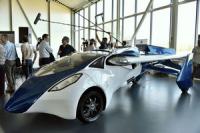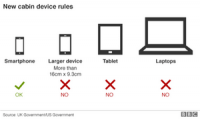-
Rising temperatures may limit aircraft takeoffs globally
Global temperatures have gone up nearly 1 degree Centigrade (1.8 Fahrenheit) since about 1980, and this may already be having an effect. In late June, American Airlines canceled more than 40 flights out of Phoenix, Ariz., when daytime highs of nearly 120 degrees made it too hot for smaller regional jets to take off. Rising temperatures due to global warming will make it harder for many aircraft around the world to take off in coming decades, says a new study. During the hottest parts of the day, 10 to 30 percent of fully loaded planes may have to remove some fuel, cargo or passengers, or else wait for cooler hours to fly, a new study shows.
-
-
Lab mistakenly ships radioactive material aboard commercial plane
Employees at the Los Alamos National Laboratory have been fired and disciplinary action against other personnel was taken after small amounts of radioactive material were mistakenly shipped aboard a commercial cargo plane. Nuclear experts say the mishap could have led to serious consequences. The rapid pressure changes during flights could have damaged the packaging, causing radiation to escape.
-
-
What air travelers will tolerate for non-discriminatory security screening
Mounting anti-terrorism security procedures and the Transportation Security Administration’s (TSA) screening processes have launched numerous debates about the protection of civil liberties and equal treatment of passengers. A new study has successfully quantified how much potential air passengers value equal protection when measured against sacrifices in safety, cost, wait time, and convenience.
-
-
U.S. imposes enhanced security measures on U.S.-bound flights from 105 countries
The United States will impose tough new security measures on all international flights bound for the United States. DHS officials said 280 airports in 105 countries would be affected by the tightened security, affecting around 2,000 flights a day. Airlines have been warned that a failure to comply with these enhanced security measures would carry consequences, including banning laptops altogether on the airlines’ U.S.-bound flights.
-
-
Protecting auto computer systems from hacks
When you and your family are zooming along the freeway, the last thing you’re worried about is the security of your car’s computer systems. That’s one reason researchers work hard on protecting vehicles from cyberattacks. Computer engineering research team is focused on the security of wireless interfaces utilized by vehicles, the number of which will only grow as autonomous cars and trucks roll closer to reality. These interfaces in our vehicles, not unlike the computers in our homes and in our hands, can be susceptible to attacks, also known as hacks. The major difference is that attacks on a vehicle’s computer systems, which are connected to critical controls, can have potentially fatal consequences.
-
-
Preventing autonomous vehicles from being hacked
Although autonomous vehicles are essentially large computers on wheels, securing them is not the same as securing a communication network that connects desktop computers and smartphones to large geographical areas due to the roles that the sensors and actuators play in the physical layer of the network. Researchers have developed an intelligent transportation system prototype designed to avoid collisions and prevent hacking of autonomous vehicles.
-
-
Germany testing face-recognition software to help police spot terrorists
Germany will be testing facial recognition software at a Berlin train station this summer to see whether it can assist police identify terror suspects more quickly. Volunteers will help police test the software at Berlin’s Suedkreuz station. If the test is successful, the use of the biometric software would be expanded to other locations, and also used to help police identify criminals, not only people suspected of terrorist activities.
-
-
Cybersecurity on the fly
When we think of cybersecurity, we think of applying protection measures to our desktop computers such as installing antivirus programs and using passcodes and pin numbers. Just like our computers, aircraft systems are vulnerable and are not exempt from a cyber-attack. If hacked, some examples of possible cyber effects on aircraft systems can be anything from breakdowns in communication and navigation systems to the more critical systems such as collision avoidance and life support systems.
-
-
Mannequin enhances training, accessibility for TSA officers
Every day, the Transportation Security Administration (TSA) screens more than two million passengers at airports nationwide. To get people to their destinations securely, TSA officers use a combination of technological and manual procedures, including pat-downs. Manual procedures are a key component of the screening process, and are part of various security measures both seen and unseen. Pat-down procedures are used to determine whether prohibited items or other threats to transportation security are concealed on a person. DHS S&T, in collaboration with the TSA Office of Requirements and Capabilities Analysis , is working to develop the Pat-down Accuracy Training Tool, also known as PATT.
-
-
Why banning laptops from airplane cabins doesn’t make sense
Recent reports suggest that terrorists can now create bombs so thin that they cannot be detected by the current X-ray screening that our carry-on bags undergo. In an effort to protect against such threats, the U.S is considering banning laptops and other large electronic devices in the passenger cabins of airplanes flying between Europe and the United States. This would extend a ban already in place on flights from eight Middle Eastern countries. It is tempting to think that any level of cost and inconvenience is sensible if it reduces the risk of an attack even a little. But risks, inherent in flying and even driving, can never be avoided entirely. So when weighing policies that are designed to make us safer, it is important to consider both their costs and potential effectiveness. Unfortunately, whether the benefits justify the costs is too often not the yardstick used by officials determining whether to pursue these types of policies. Instead, it is more likely that political considerations motivate the adoption of restrictive policies, which in the end actually do little to protect citizens’ security.
-
-
Lawsuits filed about electronic privacy, profiling abuses at borders, airports
Earlier this week, two lawsuits were filed in federal court to demand that the Department of Homeland Security (DHS) release information about how federal officials have treated travelers who are Muslim or who are perceived to be Muslim at United States borders, including airports. The lawsuits highlight the numerous recent reports of individuals who are or are perceived to be Muslim having their electronic devices searched while traveling or having their trusted traveler status revoked without explanation.
-
-
Uber picks Dallas, Fort Worth as test cities for flying vehicle network

Uber is looking to North Texas as a testing ground for its initiative to make intra-urban flying vehicle rides a reality. The company announced Tuesday that Dallas and Fort Worth are its first U.S. partner cities for what its dubbing the “Uber Elevate Network.” The company hopes to have the first demonstration of how such a network of flying, hailed vehicles would work in three years. The company also tapped a Dallas real estate development firm and Fort Worth’s Bell Helicopter to develop pick-up and drop-off sites for electric vehicles that would take-off and land vertically.
-
-
U.S. considering extending electronic-device flight ban to European travelers

Passengers flying from the United Kingdom to the United States may soon be barred from carrying their laptops with them, U.K. government officials said Monday. U.K. government sources said they were advised by American security officials that the Trump administration is planning on enforce the electronic device ban on flights from several European countries. The ban, if implemented, will go into effect before the busy summer travel season begins.
-
-
Automated, real-time automobile cow-avoidance device

India has the second largest road network in the world, and a large number of traffic accidents: 1 in 20,000 people die there in a road traffic accident, and 12 in 70,000 are seriously injured in such accidents. India also has a large number of cows roaming streets and roads, and a large number of incidents in which cars run into loitering cows. India researchers have developed a real-time automatic obstacle detection and alert system which determines whether an object near the vehicle is an on-road cow and whether or not its movements represent a risk to the vehicle. If the cow poses a risk to the vehicle, an audio or visual indicator then alerts the driver to apply the brakes.
-
-
Earthquake early warning vital for city transit
Although no one can reliably predict earthquakes, today’s technology is advanced enough to rapidly detect seismic waves as an earthquake begins, calculate the maximum expected shaking, and send alerts to surrounding areas before damage can occur. This technology is known as “earthquake early warning” (EEW). An EEW system called “ShakeAlert” is being developed and tested for the West Coast of the United States.
-
More headlines
The long view
Prototype Self-Service Screening System Unveiled
TSA and DHS S&T unveiled a prototype checkpoint technology, the self-service screening system, at Harry Reid International Airport (LAS) in Las Vegas, NV. The aim is to provide a near self-sufficient passenger screening process while enabling passengers to directly receive on-person alarm information and allow for the passenger self-resolution of those alarms.
